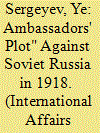| Srl | Item |
| 1 |
ID:
157271


|
|
|
|
|
| Summary/Abstract |
The several weeks in August-September 1918 when the Soviet regime, barely 12 months old, was hanging by a thread (which Bolshevik leaders also admitted) can be described as the most dramatic period in the history of Soviet-British relations. An open armed intervention of the Entente powers that sided with the anti-Communist forces threatened to bury the hopes of Lenin and his comrades-in-arms to retain power in expectation of a worldwide revolution. Indeed, Soviet power was liquidated practically across the entire country (with the exception of several gubernias of its European part) while riots and conspiracies in the capitals and the biggest cities and the ongoing world war were ruining the country's economy and bringing hunger and epidemics.
|
|
|
|
|
|
|
|
|
|
|
|
|
|
|
|
| 2 |
ID:
133236


|
|
|
|
|
| Publication |
2014.
|
| Summary/Abstract |
James Margach famously argued that Prime Ministers from Lloyd George to Callaghan had been intent on exploiting the media in their determination to centralise power. From Margaret Thatcher onwards, however, there is a strong argument that the power relationship has been reversed, and that the Leveson Inquiry-set up in the wake of the phone hacking scandal-exposed a political class which had become deeply fearful of the power and influence of the national press. Citing evidence to Leveson and subsequent recommendations by the inquiry, this article presents two case studies-on data protection and on media ownership-where the public interest clearly demanded political intervention, which would be inconvenient for the major publishers. And yet, despite recommendations by Lord Justice Leveson and despite clear support from leading politicians of all parties, there has been virtually no policy progress in either case. While the Leveson Inquiry was billed as a watershed in press-politician relations and an opportunity to counteract decades of unhealthy press power, political inertia in these two areas suggests that very little has changed.
|
|
|
|
|
|
|
|
|
|
|
|
|
|
|
|
| 3 |
ID:
154867


|
|
|
|
|
| Summary/Abstract |
During World War One, both Arabs and Zionists sought to become “the tools of British imperialism.” The British exploited both as their own interests dictated, without giving a thought for future consequences. In 1915, the MacMahon-Husayn correspondence – conducted between Britain's High Commissioner in Cairo and a non-representative Arab Bedouin leader from the Arabian Peninsula – ended inconclusively, without agreement. In contrast, the Balfour Declaration - the culmination of 6 months of British-initiated negotiations with the Zionists, was published in order to further Britain's military, strategic and propaganda interests. At the time, the British considered it to have been a ‘brilliant coup’.
|
|
|
|
|
|
|
|
|
|
|
|
|
|
|
|